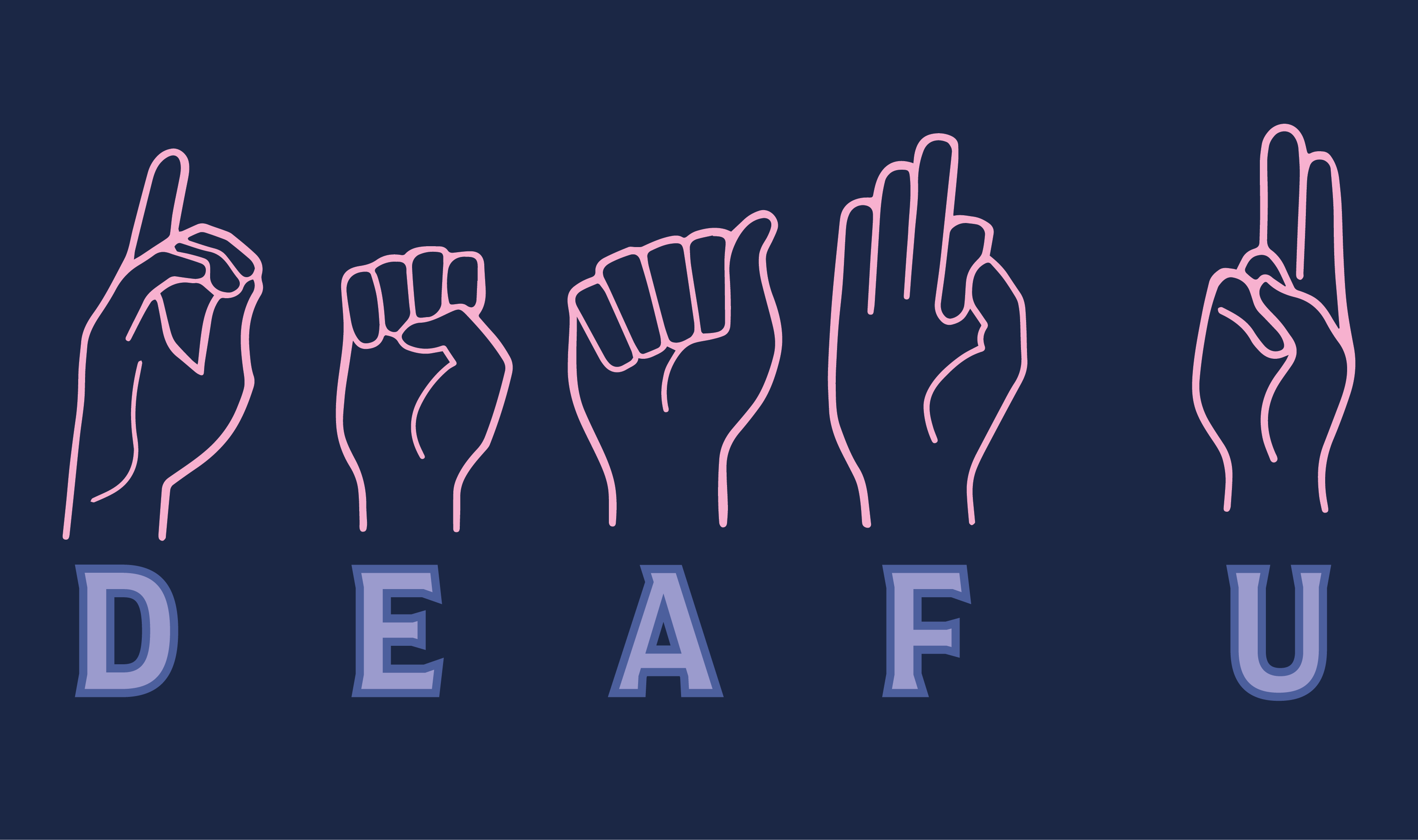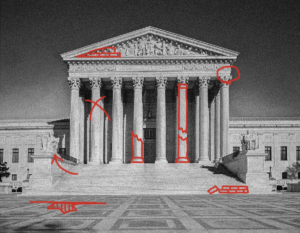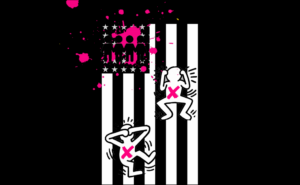Disclaimer: This piece comes from a hearing perspective.
If you travel five miles directly east of Georgetown’s gates, you will reach a campus that is unlike any other, even if that isn’t immediately noticeable. Indoors, the hallways are wider than normal, to allow for side-by-side, ambulatory conversation. The windows streaming in natural light are larger, to optimize sight. The traditional college student may not realize that the brightly colored furniture contrasts with skin color, or that the sounds of footsteps and laughter bounce off the walls, with acoustics more reverberant to account for different levels of hearing ability. Parties may still feature a heavy bassline, but the lights are bright instead of dimmed, so signed conversation is possible. Gallaudet University, known as “Gally” to its students, is a university architecturally and culturally designed for and by the Deaf/deaf/hard of hearing* community—catering to all varieties of hearing level. Deaf U, Netflix’s new eight-episode reality series set within the complex Gallaudet student culture, mirrors this setting in an emotional rather than physical way—presenting college life from the deaf perspective.
Deaf U follows seven friends who fit into the Deaf community in juxtaposing ways. There is Tessa, a member of the Gallaudet “elite,” a clique of students born to deaf families and raised with ASL as their first language, and Daequan, a hard-of-hearing student who arrived at Gallaudet with no signing experience at all. Another “elite” featured, Alexa Paulay-Simmons, shared that she elected to be a part of the show because of her “really different perspective towards the deaf community.”
“Despite growing up in the deaf community, I decided to leave and move to Hawaii to explore life as we know it,” Paulay-Simmons said in an interview with the Voice. “But soon came to the realization that I needed deaf community and Gallaudet for my personal and professional growth.”
There is Rodney, who communicates in both the hearing and Deaf worlds with a cochlear implant, and his football teammate Dalton, who flushed his hearing aids down the toilet in high school to embrace the Deaf world entirely. Finally, there is aspiring influencer Cheyanna, who finds herself struggling to fit in as her “elite” classmates shun her attempts to cross hearing/deaf boundaries, and Renate, whose frustrations lie beyond school drama, as she strives to come to terms with her own childhood traumas.
Throughout the series, regardless of their differences, the seven cast members embark on their respective paths of self-discovery, including exploring their sexual and romantic relationships, the rippling consequences of past choices, and their places in both the Deaf and wider world. As a D.C. college student, it is not just the imagery—studying on the lawn, Union Market breakfasts—that feel familiar, but the insecurities and inner conflicts so present in college life as well.
The Deaf U cast displays a level of bravery that is utterly admirable. For the most part, each episode focuses on about three storylines, featuring either individual cast members or groups of them, as they navigate their familial and social lives. For just eight episodes, the portrayal of the seven students is impressively multi-faceted—they discuss their experiences with abortion, domestic violence, childhood trauma, and both the triumphs and struggles of love. Their personal growth is evident; each individual warms to the camera, willing to share more components of their stories as the series continues.
Daequan, despite repeatedly reminding confessional producers of his unwillingness to share his emotions, concludes the semester-long series with a reflection on how his mother’s early death and his subsequent difficult childhood impacted his own relationship with love and family. Paulay-Simmons struggles throughout the series to figure out what she wants in a relationship, trying to discover what it means to be loved in the wake of a distant relationship with her father. She leaves the series having confronted her father about his shortcomings, leading her to recommit to a boyfriend she knows loves her. Rodney is looking to shrug off his player image and be faithful, and by the end of the series, reveals his heart will seemingly always lie with his first love.
At times, the cornerstones of youth experience that make the show so special get lost behind dramatized portrayals of sex, jealousy, and mean-girl-esque behavior. The seventh episode’s Halloween party featured a few too many production-heavy situations—including a heavily implied bathroom hookup and bullying via lollipop—when the actual event seemed more like a chill college party between friends. That said, the raw, personal moments of sexual expression—look no further than Renate’s slam poetry performance in the third episode—are unadulterated and lovely.
The series is not without flaws. In terms of representation, there is a lack of women of color and LGBTQ+ individuals, though in a panel on “The Making of Deaf U,” available on Gallaudet’s Facebook page, producers have addressed the series’s goals to improve this in potential future seasons. Opposition has arisen within the Deaf community over the show’s focus on the cast’s personal experiences rather than issues facing deaf people, as well as for focusing too much on the problems within the deaf community rather than the vibrance of Deaf culture.
The main “mean girl” of the series, Tessa, is depicted as more one-sided than her peers, yet her message speaks to the underlying reasons behind the hierarchy within the Deaf community. In the first episode, Tessa and her elite friends criticize a video Cheyanna made, which utilizes hearing-friendly mouthing alongside signing rather than true ASL. Cheyanna rebukes the girls as “haters,” expressing her frustration that though deaf herself, her roots in the hearing world make her “not deaf enough” for the Gallaudet elites. In the end, Cheyanna chose to leave Gallaudet due to her perception of “not being deaf enough,” wanting to escape what she felt was a community unsupportive of her dreams.
Though the benefits of a deaf community are more implied rather than discussed, Paulay-Simmons actually transferred to Gallaudet, in contrast to Cheyanna’s exit.
“I have tasted the best of both worlds and I thought I could offer a different insight on the show,” she said.
However, Paulay-Simmons believes that her part in the show was reduced to cover more superficial topics than she hoped. “Turned out my story line was all about my dating life.”
Deaf U fails to give the “elite” point of view the same fully-developed portrayal it gives to other perspectives. Though the show demonstrates the truth that there is “no right way to be deaf,” it does not address the underlying fear behind Deaf families’ protective instincts towards the language and culture that their ancestors have created. Though elites act like they rule the campus at Gallaudet, in reality, they are a minority—only 10 percent of deaf individuals are born to deaf parents. Every year, more and more Gallaudet students arrive on campus like Daequan, with no sign experience, or Rodney, with a cochlear implant. These debates are complex, and though the question is not whether these individuals belong to the Deaf community—diversity of deafness enriches what Deaf culture entails—there is a worry that with increasing technology, deaf children of hearing parents will not identify as Deaf at all and that one day the culture and the language as it is will diminish. Perhaps partially due to the college setting, the series presents this issue reductively and takes away from its real intricacies throughout the community.
College is rife with juxtapositions. Students balance two lives, home and school; two loyalties, family and friends; two sets of values, those you were raised with and those you discover for yourself. For some, it is about finding your place in two cultures, hearing and Deaf. It is a time to make mistakes that will be all but forgotten 10 years later yet will shape all your decisions from their occurrences. It is a time to figure out how to love both others and yourself and to navigate both friendships and self-discovery. The shortcomings of Deaf U reveal necessary avenues the show could take in the future, but ultimately, the series does what it set out to do.
“We are humans navigating life as humanly as possible,” Paulay-Simmons shared, “just because we can’t hear does not mean we experience life differently. We just have a different culture.”
Deaf U is college—from the deaf perspective.
*For clarification, “deaf” refers to the state of hearing loss in a medical sense, while “Deaf” is an identification with Deaf culture.






